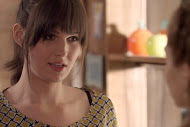@aRTShrian @myNewYorkeye @michellehendley Great talking! I wish all my interviews felt like hanging out with a cool friend! @wolfevideo @Mrericschaeffer
This was director Eric Schaeffer’s tweet after my interview with him for his latest movie, Boy Meets Girl. But I have to say; to me it felt like talking to a cool friend, who’s not just a very smart & brilliant film-maker but an amazing, kind and wonderful person as well. Why? Well, you can read excerpts from my phone conversation with him below and see… And there are spoilers, and some great insights, so I suggest watching the movie, before you read this.
Art Shrian: Congratulations Eric, on this wonderful movie, I just loved it. What man likes to admit it, but hell, it put tears in my eyes. So why did you make this movie?
Eric Schaeffer: I’m passionate about breaking the mold of sexual and emotional convention in the pursuit of creating more unity in our increasingly fractured world. Being a ‘straight man,’ albeit one who admits to many things most straight men don’t, and living my life with a colorful spectrum of sexual and emotional tastes, desires and behaviors that don’t always seem to be accepted, I feel a duty to portray characters in my films who, like myself, admit to and accept without condition the parts of themselves and others that can be best described and must start being labeled as one thing and one thing only: human. That is why I make any film. That is why I was inspired to make this romantic comedy. I hope it's meaningful to you.
Art Shrian: That’s great. But you are a NYC filmmaker, why take this movie all the way south?
Eric Schaeffer: I wanted to help destroy as many stereotypes as we can, with this film. And it’s fair to say that there’s more bigotry in south, but it’ll be unfair to say that there are towns, which are completely opposite. And during my research for the movie, talking to many transgender women, I was surprised that many of them were from small town in south, and had very loving and supporting families. So I wanted to blow up that myth.
Art Shrian: And that does work really well for the movie. You expect all that negativity around her and certain challenges, but may get surprised by her reality and her completely different kind of challenges. And it’s beautifully shot, with some great visuals of southern USA. Plus being in “republican country”, the republican father’s character has one of the best Tea-party/Tea-bagging moments of the movie. It was just hilarious.
Eric Schaeffer: (laughing)Thanks, that’s my favorite too!
Art Shrian: But do you feel that the movie portrays that Ricky doesn’t have enough challenges or hurdles? Is it like real life or too unreal?
Eric Schaeffer: It’s meant to be realistic, but also meant to be a modern fable, with fablistic ending. The fable invites us in a way that’s familiar and therefore unthreatening. It’s important that we illustrate in our society that happy fablistic endings include all of us, any sex, any race, anyone, all of us. And I slightly disagree about hurdles, that there are still many hurdles to cross. Like David & Francesca relationship, them postponing there wedding, so we don’t know what’s going to happen with them. We don’t know about what happens with Ricky moving to New York and wanting to be a fashion designer. So in my opinion, the movie errs on the side of being realistic than being unrealistic.
Art Shrian: Well, I’ll have to agree to that. However, I was wondering about hurdles for Ricky as a transgender girl, and from Francesca’s fiancée, father and mother.
Eric Schaeffer: With father & mother, it’s a very complex POV. Mother is being very protective of her daughter, wanting her daughter to not get her heart broken. And she’s right that Ricky doesn’t see a forever thing with her. So in that moment she’s just being a protective mother, having nothing to do with gender and sexual orientation. But there is clearly a subtext that she’s a bigot. And same for father, who doesn’t understand what’s transgender, but just loves her daughter and wants her to be treated with respect.
Art Shrian: Thanks for explaining that, I didn’t think of it that way until now and the multiple layers of complexity there. And it’s in so many scenes, with multiple scenes going on in the same scene, and lot of subtext. And that gives every actor great exposure and enough to play with, regardless of how much screen-time they have.
Eric Schaeffer: Thank you for saying that. You are my perfect audience person, to get the film.
Art Shrian: Thanks back at you. So what else are you working on?
Eric Schaeffer: Putting an independent film out is a gargantuan effort, bigger than making the film. Now that it’s out on many platforms, I’ll spend next couple months in just putting this movie out there in front of as many people as I can. Then, starting to think about my next project for summer, I’m thinking of making a television series about events after this film or a series centered around a transgender girl. Something I’m just thinking about right now.
Art Shrian: I think that’ll make a great show to watch, which sounds pretty exciting. The movie does leave you hungry for that… So, with all the platforms available now for distribution, what do you think, how does that impact future of filmmaking, especially for independent filmmakers.
Eric Schaeffer: There’s an upside and downside. I hate to say but I’m an old school filmmaker, I shot on actual film which I love, and films were seen in movie theaters, on big screen. I love that experience. I love TV Too, but it’s a very different experience, an art form for small screen. Films are to be watched in dark room, with many people, on large screen. Although that’s getting harder and harder for independent films, especially with no stars in it. That’s the downside… Now the upside is millions of people around the world can see an independent film, when before it’ll be impossible to reach them. That’s obviously and incredible and fantastic evolution of the technology behind. But again, downside of that is, because so many people are able to make film very cheaply, there is a watering down of content. And it’s harder for audience to weed through and find the gems.
Art Shrian: I cannot agree more. One last thing, you’re a New York filmmaker and a New Yorker. Any organizations, causes etc. you support here? What’s your thing?
Eric Schaeffer: That’s a very good question. I grew up here, I lived here my entire life, my family lives here, I love this town. So, I have deep-deep love for my hometown. Having said that, (laughs) I kinda feel ashamed that nothing jumps out at me in terms of a cause. I like to feel like just living a life of respect and love and consideration towards everybody you come in contact with on a moment-to-moment basis, is the way we can affect the greatest change in our world. In that I come across al kind of causes every day of life, like people on the street, elderly with their bags, or disabled, or someone hailing trouble hailing a taxicab. In 80s and 90s I was a taxi cab driver, and I’ll take young black kids from 80s and Broadway, to Harlem, who would be just waiting get picked but not much luck from white cab drivers, and 15 mins of ride and evidence that there was unity racially in the city. Even today, doing meals on wheels, volunteering for elderly and being big brother to young kids, like this black HIV positive kid for few years. Just those little things. I don’t think there’s any greater hand-to-hand effect we can have, but being good to everyone we come in contact with.
Art Shrian: Thanks for being honest. You’re being very modest, that’s actually really great.
Eric Schaeffer: Thanks. How our culture treats elderly, I feel very said about it. And Racial Unity. Those would be two causes if I had to say.
Art Shrian: I think as an artist, we have responsibility towards society. And art, films and cinema can make a lot of difference. What do you think about it? What do you think is role of filmmakers in society?
Eric Schaeffer: Role of any artist in society is to unify. Responsibility is a strong word, and we all have some responsibility as human beings. By mirroring through our art, the true and authentic human experience, we can unify people.
Art Shrian: Very well said, thanks a lot Eric. All the best for this wonderful film and hopefully next time we can have this conversation in person, in our New York City, the most wonderful and best city in the world.
Eric Schaeffer: Absolutely!
*****************************************************
BOY MEETS GIRL is an authentic Southern romantic-comedy starring the newcomer Michelle Hendley as Ricky, a young transwoman trying to navigate life and looking for romance in her small Kentucky hometown. Will she find love with the beautiful rich girl Francesca (Alexandra Turshen, RED OAKS) or with her lifelong best pal Robby (Michael Welch, TWILIGHT franchise)? Authentically written and directed by accomplished indie filmmaker Eric Schaeffer (IF LUCY FELL starring Sarah Jessica Parker, Ben Stiller, Elle Macpherson, NEVER AGAIN starring Jeffrey Tambor and Jill Clayburgh), BOY MEETS GIRL simultaneously exemplifies and transcends the category of "LGBT film" to present the very human story of the blurry and complicated lines between friendship and romance, gender and sexuality.
RELEASE PLATFORMS:
AVAILABLE TODAY (April 7) ON iTUNES, GOOGLE PLAY, AMAZON INSTANT, VUDU, WOLFEONDEMAND.COM + ON CABLE VIA TIME-WARNER, COMCAST, CHARTER & COX. DVD WILL BE AVAILABLE THROUGH AMAZON, NETFLIX, BESTBUY.COM,BARNESANDNOBLE.COM, FAMILY VIDEO, WOLFEVIDEO.COM, AND MANY OTHER RETAILERS.



